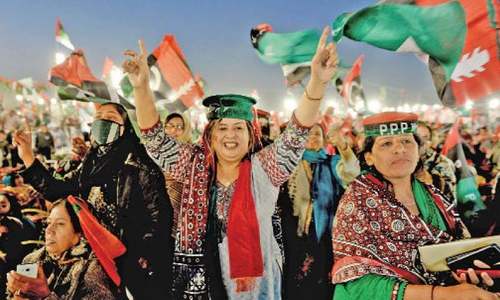KARACHI: Independent candidate Leela Lohar, contesting from NA-218, had blisters on her feet from doing door-to-door campaigning. In the time a political party candidate travelling in his or her land cruiser has met a thousand voters, Leela only meets five because she doesn’t have access to extensive financial resources. She only has good intentions.
Also read: Record number of 171 women in the run for NA general seats
The Mirpurkhas-I constituency from where Leela is contesting has a load of problems which many elected from the area earlier have overlooked.
“There is no water, no gutters, no drains, no good schools,” said Leela, adding that life for women there, especially women from the minorities, could be tough. “I feel for our women, so I stepped out of my home to fight for their rights,” she said.
Leela was speaking at a consultation meeting with minority women candidates contesting in the upcoming elections for national and provincial assembly seats from Sindh which was organised by the Sindh Commission on the Status of Women (SCSW) at their office here on Tuesday.
Radha Bheel, another independent candidate contesting from PS-48 Mirpurkhas-II, said she belonged to the scheduled caste but earlier during the 1998 Pakistan census there were two boxes, one for Hindus and one for scheduled caste and not knowing that they should have put a tick there, most Dalit Hindus put a tick in the box for Hindus.
“There were so many of us Dalit Hindus but this way their number after the census was something like 300,000 whereas Hindus showed up as 2.8 million though the truth is that the scheduled caste is a majority in a minority,” she said.
Women candidates from minorities discuss issues they are facing in electoral race
“Due to what happened, the government only set aside resources for 300,000 Dalits even though there were so many,” she explained, adding that because of this she ran an awareness campaign during the recent census for her people so that they could get their basic rights at least.
“Bringing up a better number of scheduled caste members on record this time around, I decided to work with them on the elections,” she said. “I realise that we have a big vote bank but we are financially weak. Earlier, no political party would give a ticket to anyone from the scheduled caste be it a man or woman. But seeing our popularity among our people, they have tried approaching us now though we have turned them down,” she said.
Sharing her mandate, Radha said her people had suffered a lot due to the lack of education, so education would have to be her priority. “After education we will fight for our basic rights,” she said.
"I’m with all women"
Nomi Bashir, another independent candidate who is contesting from NA-244, said that being Christian she was already well aware of the issues faced by the minorities in Pakistan.
“That is why I had always prayed to God to enable me to help my community,” she said.
About the challenges being faced by her while campaigning, Nomi said she was being pressured by some parties to not contest at all.
“I find my posters pulled down or torn up, I also see comments written on my pictures. When we are going door-to-door many don’t even open their door for us. But my message is the message of peace. I am with all women no matter what their faith,” she said.
Erum Afshan, who does belong to a political party, the National Party, said she was contesting for a reserved minority seat. “Many of our [possible] voters don’t even have CNICs,” she said.
Samina Nawab, contesting from NA-252, said she got offers of money, which she ignored. “I tell those calling me or sending me such messages to use that money on the betterment of the people,” she said.
Mangla Sharma, contesting for PS-113, said she felt her own people, who are also in minority and who are also into politics, felt insecure and became her adversaries.
Women’s participation in polls lauded
Appreciating women’s participation in the 2018 elections, Asad Butt, vice chairperson of the Human Rights Commission of Pakistan, Sindh, said it didn’t matter whether they won or lost in the elections, just their coming out of their homes was helping the political process.
William Sadiq, an activist, said it was noteworthy that for the first time so many women were contesting from general seats. “They are challenging the norms of the political system,” he said.
Human rights activist Malka Khan observed that there were not as many women in the assemblies before 2002, which resulted in women’s issues and pro-women legislation getting sidelined.
Mahnaz Rahman, director of the Aurat Foundation, said candidates hailing from political parties had their parties’ support but independent candidates deserved financial help from the government as everything from filing their papers to getting voters’ lists cost thousands of rupees, which they did not have.
Nuzhat Shirin, chairperson of the SCSW, said that the women contesting for general seats and that too independently deserved respect.
“Big political party candidates are more prominent than independent candidates, and minority candidates are almost invisible,” she said.
Published in Dawn, July 11th, 2018
































